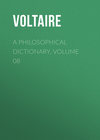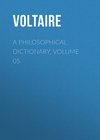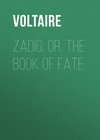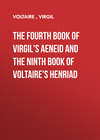Loe raamatut: «A Philosophical Dictionary, Volume 08», lehekülg 11
SECTION IV
People who never think frequently inquire of those who do think, what has been the use of philosophy? To destroy in England the religious rage which brought Charles I. to the scaffold; to deprive an archbishop in Sweden of the power, with a papal bull in his hand, of shedding the blood of the nobility; to preserve in Germany religious peace, by holding up theological disputes to ridicule; finally, to extinguish in Spain the hideous and devouring flames of the Inquisition.
Gauls! unfortunate Gauls! it prevents stormy and factious times from producing among you a second "Fronde," and a second "Damiens." Priests of Rome! it compels you to suppress your bull In cœna domini, that monument of impudence and stupidity. Nations! it humanizes your manners. Kings, it gives you instruction!
SECTION V
The philosopher is the lover of wisdom and truth; to be a sage is to avoid the senseless and the depraved. The philosopher, therefore, should live only among philosophers.
I will suppose that there are still some sages among the Jews; if one of these, when dining in company with some rabbis, should help himself to a plate of eels or hare, or if he cannot refrain from a hearty laugh at some superstitious and ridiculous observations made by them in the course of conversation, he is forever ruined in the synagogue; the like remark may be made of a Mussulman, a Gueber, or a Banian.
I know it is contended by many that the sage should never develop his opinions to the vulgar; that he should be a madman with the mad, and foolish among fools; no one, however, has yet ventured to say that he should be a knave among knaves. But if it be required that a sage should always join in opinion with the deluders of mankind, is not this clearly the same as requiring that he should not be an honest man? Would any one require that a respectable physician should always be of the same opinion as charlatans?
The sage is a physician of souls. He ought to bestow his remedies on those who ask them of him, and avoid the company of quacks, who will infallibly persecute him. If, therefore, a madman of Asia Minor, or a madman of India, says to the sage: My good friend, I think you do not believe in the mare Borac, or in the metamorphoses of Vishnu; I will denounce you, I will hinder you from being bostanji, I will destroy your credit; I will persecute you – the sage ought to pity him and be silent.
If ignorant persons, but at the same time persons of good understanding and dispositions, and willing to receive instruction, should ask him: Are we bound to believe that the distance between the moon and Venus is only five hundred leagues, and that between Mercury and the sun the same, as the principal fathers of the Mussulman religion insist, in opposition to all the most learned astronomers? – the sage may reply to them that the fathers may possibly be mistaken. He should at all times inculcate upon them that a hundred abstract dogmas are not of the value of a single good action, and that it is better to relieve one individual in distress than to be profoundly acquainted with the abolishing and abolished. When a rustic sees a serpent ready to dart at him, he will kill it; when a sage perceives a bigot and a fanatic, what will he do? He will prevent them from biting.
PHILOSOPHY
SECTION I
Write filosophy or philosophy as you please, but agree that as soon as it appears it is persecuted. Dogs to whom you present an aliment for which they have no taste, bite you. You will say that I repeat myself; but we must a hundred times remind mankind that the holy conclave condemned Galileo; and that the pedants who declared all the good citizens excommunicated who should submit to the great Henry IV., were the same who condemned the only truths which could be found in the works of Descartes.
All the spaniels of the theological kennel bark at one another, and all together at de Thou, la Mothe, Le Vayer, and Bayle. What nonsense has been written by little Celtic scholars against the wise Locke!
These Celts say that Cæsar, Cicero, Seneca, Pliny, and Marcus Aurelius, might be philosophers, but that philosophy is not permitted among the Celts. We answer that it is permitted and very useful among the French; that nothing has done more good to the English; and that it is time to exterminate barbarity. You reply that that will never come to pass. No; with the uninformed and foolish it will not; but with honest people the affair is soon concluded.
SECTION II
One of the great misfortunes, as also one of the great follies, of mankind, is that in all countries which we call polished, except, perhaps, China, priests concern themselves with what belongs only to philosophers. These priests interfered with regulating the year; it was, they say, their right; for it was necessary that the people should know their holy days. Thus the Chaldæan, Egyptian, Greek, and Roman priests, believed themselves mathematicians and astronomers; but what mathematics and astronomy! Whoever makes a trade of quackery cannot have a just and enlightened mind. They were astrologers, and never astronomers.
The Greek priests themselves first made the year to consist only of three hundred and sixty days. Their geometricians must have informed them that they were deceived by five days and more. They, therefore, corrected their year. Other geometricians further showed them that they were deceived by six hours. Iphitus obliged them to change their Greek almanac. They added one day in four years to their faulty year; Iphitus celebrated this change by the institution of the Olympiads.
They were finally obliged to have recourse to the philosopher Meton, who, combining the year of the moon with that of the sun, composed his cycle of nineteen years, at the end of which the sun and moon returned to the same point within an hour and a half. This cycle was graven in gold in the public place of Athens; and it is of this famous golden number that we still make use, with the necessary corrections.
We well know what ridiculous confusion the Roman priests introduced in their computation of the year. Their blunders were so great that their summer holidays arrived in winter. Cæsar, the universal Cæsar, was obliged to bring the philosopher Sosigenes from Alexandria to repair the enormous errors of the pontiffs. When it was necessary to correct the calendar of Julius Cæsar, under the pontificate of Gregory XIII., to whom did they address themselves? Was it to some inquisitor? It was to a philosopher and physician named Lilio.
When the almanac was given to Professor Cogé, rector of the university, to compose, he knew not even the subject. They were obliged to apply to M. de Lalande, of the Academy of Sciences, who was burdened with this very painful task, too poorly recompensed. The rhetorician Cogé, therefore, made a great mistake when he proposed for the prize of the university this subject so strangely expressed:
"Non magis Deo quam regibus infensa est ista quæ vocatur hodie philosophia." – "That which we now call philosophy, is not more the enemy of God than of kings." He would say less the enemy. He has taken magis for minus. And the poor man ought to know that our academies are not enemies either to the king or God.
SECTION III
If philosophy has done so much honor to France in the "Encyclopædia," it must also be confessed that the ignorance and envy which have dared to condemn this work would have covered France with opprobrium, if twelve or fifteen convulsionaries, who formed a cabal, could be regarded as the organs of France; they were really only the ministers of fanaticism and sedition; those who forced the king to dissolve the body which they had seduced. Their fanatical credulity for convulsions and the miserable impostures of St. Médard, was so strong, that they obliged a magistrate, elsewhere wise and respectable, to say in full parliament that the miracles of the Catholic church always existed. By these miracles, we can only understand those of convulsions, for assuredly it never performed any others; at least, if we believe not in the little children resuscitated by St. Ovid. The time of miracles is passed; the triumphant church has no longer occasion for them. Seriously, was there one of the persecutors of the Encyclopædia who understood one word of the articles Astronomy, Dynamics, Geometry, Metaphysics, Botany, Medicine, or Anatomy, of which this book, become so necessary, treats in every volume. What a crowd of absurd imputations and gross calumnies have they accumulated against this treasure of all the sciences! They should be reprinted at the end of the "Encyclopædia," to eternize their shame. See what it is to judge a work which they were not even fit to study. The fools! they have exclaimed that philosophy ruined Catholicism. What, then, in twenty millions of people, has one been found who has vexed the least officer of the parish! one who has failed in respect to the churches! one who has publicly proffered against our ceremonies a single word which approached the virulence with which these railers have expressed themselves against the regal authority! Let us repeat that philosophy never did evil to the state, and that fanaticism, joined to the esprit du corps, has done much in all times.
SECTION IV
Substance Of Ancient Philosophy
I have consumed about forty years of my pilgrimage in two or three corners of the world, seeking the philosopher's stone called truth. I have consulted all the adepts of antiquity, Epicurus and Augustine, Plato and Malebranche, and I still remain in ignorance. In all the crucibles of philosophers, there are perhaps two or three ounces of gold, but all the rest is caput mortuum, insipid mire, from which nothing can be extracted.
It seems to me that the Greeks, our masters, wrote much more to show their intellect, than they made use of their intellect to instruct themselves. I see not a single author of antiquity who has a consistent, methodical, clear system, going from consequence to consequence.
All that I have been able to obtain by comparing and combining the systems of Plato, of the tutor of Alexander, Pythagoras, and the Orientals, is this: Chance is a word void of sense; nothing can exist without a cause. The world is arranged according to mathematical laws; therefore, it is arranged by an intelligence.
It is not an intelligent being like myself who presided at the formation of the world; for I cannot form a miserable worm; therefore, the world is the work of an intelligence prodigiously superior. Does this being, who possesses intelligence and power in so high a degree, necessarily exist? It must be so, for he must either have received being from another, or through his own nature. If he has received his being from another, which is very difficult to conceive, I must look up to this other, which will in that case be the first cause. On whichever side I turn, I must admit a first cause, powerful and intelligent, who by his own nature is necessarily so.
Has this first cause created things out of nothing? We cannot conceive that to create out of nothing is to change nothing into something. I cannot admit such a creation, at least until I find invincible reasons which force me to admit what my mind can never comprehend. All that exists appears to exist necessarily, since it exists; for if to-day there is a reason for the existence of things, there was one yesterday; there has been one in all times; and this cause must always have had its effect, without which it would have been a useless cause during eternity.
But how can things have always existed, being visibly under the hand of the first cause? This power must always have acted in like manner. There is no sun without light, there is no motion without a being passing from one point of space to another.
There is, therefore, a powerful and intelligent being who has always acted; and if this being had not acted, of what use to him would have been his existence? All things are, therefore, emanations from this first cause. But how can we imagine that stone and clay may be emanations of the eternal, intelligent, and puissant being? Of two things, one must be; either that the matter of this stone and mine necessarily exists of itself, or that it exists necessarily by this first cause; there is no medium.
Thus, therefore, there are but two parts to take; either to admit matter eternal of itself, or matter eternally proceeding from a powerful, intelligent, eternal being. But existing of its own nature, or emanating from a producing being, it exists from all eternity, because it exists; and there is no reason that it might not have always existed.
If matter is eternally necessary, it is in consequence impossible – it is contradictory, that it should not exist; but what man can assure you that it is impossible, that it is contradictory, that this fly and this flint have not always existed? We are, however, obliged to swallow this difficulty, which more astonishes the imagination than contradicts the principles of reasoning.
Indeed, as soon as we have conceived that all has emanated from the supreme and intelligent being; that nothing has emanated from him without reason; that this being, always existing, must always have acted; that, consequently, all things must have eternally proceeded from the bosom of his existence – we should no more be deterred from believing the matter of which this fly and flint are formed is eternal, than we are deterred from conceiving light to be an emanation of the all-powerful being.
Since I am an extended and thinking being, my extent and thought are the necessary productions of this being. It is evident to me that I cannot give myself extent or thought. I have, therefore, received both from this necessary being.
Can he have given me what he has not? I have intelligence; I am in space; therefore, he is intelligent and is in space. To say that the Eternal Being, the All-Powerful God, has from all time necessarily filled the universe with His productions, is not taking from Him His free-will; but on the contrary, for free-will is but the power of acting. God has always fully acted; therefore God has always used the plenitude of His liberty.
The liberty which we call indifference is a word without an idea – an absurdity; for this would be to determine without reason; it would be an effect without a cause. Therefore God cannot have this pretended free-will, which is a contradiction in terms. He has, therefore, always acted by the same necessity which causes His existence. It is, therefore, impossible for the world to exist without God; it is impossible for God to exist without the world. This world is filled with beings who succeed each other; therefore, God has always produced beings in succession.
These preliminary assertions are the basis of the ancient eastern philosophy, and of that of the Greeks. We must except Democritus and Epicurus, whose corpuscular philosophy has combated these dogmas. But let us remark that the Epicureans were founded on an entirely erroneous philosophy, and that the metaphysical system of all the other philosophy subsisted with all the physical systems. All nature, except the void, contradicts Epicurus, and no phenomenon contradicts the philosophy which I explain. Now, a philosophy which agrees with all which passes in nature, and which contents the most attentive mind, is it not superior to all other unrevealed systems?
After the assertions of the most ancient philosophers, which I have approached as nearly as possible, what remains to us? A chaos of doubts and chimeras. I believe that there never was a philosopher of a system who did not confess at the end of his life that he had lost his time. It must be confessed that the inventors of the mechanical arts have been much more useful to men than the inventors of syllogisms. He who imagined a ship, towers much above him who imagined innate ideas.
PHYSICIANS
Regimen is superior to medicine, especially as, from time immemorial, out of every hundred physicians, ninety-eight are charlatans. Molière was right in laughing at them; for nothing is more ridiculous than to witness an infinite number of silly women, and men no less than women, when they have eaten, drunk, sported, or abstained from repose too much, call in a physician for the headache, invoke him like a god, and request him to work the miracle of producing an alliance between health and intemperance, not omitting to fee the said god, who laughs at their folly.
It is not, however, the less true that an able physician may preserve life on a hundred occasions, and restore to us the use of our limbs. When a man falls into an apoplexy, it is neither a captain of infantry nor a sergeant at law who will cure him. If cataracts are formed on my eyes, it is not my neighbor who will relieve me. I distinguish not between physicians and surgeons, these professions being so intimately connected.
Men who are occupied in the restoration of health to other men, by the joint exertion of skill and humanity, are above all the great of the earth. They even partake of divinity, since to preserve and renew is almost as noble as to create. The Roman people had no physicians for more than five hundred years. This people, whose sole occupation was slaughter, in particular cultivated not the art of prolonging life. What, therefore, happened at Rome to those who had a putrid fever, a fistula, a gangrene, or an inflammation of the stomach? They died. The small number of great physicians introduced into Rome were only slaves. A physician among the great Roman patricians was a species of luxury, like a cook. Every rich man had his perfumers, his bathers, his harpers, and his physician. The celebrated Musa, the physician of Augustus, was a slave; he was freed and made a Roman knight; after which physicians became persons of consideration.
When Christianity was so fully established as to bestow on us the felicity of possessing monks, they were expressly forbidden, by many councils, from practising medicine. They should have prescribed a precisely contrary line of conduct, if it were desirable to render them useful to mankind.
How beneficial to society were monks obliged to study medicine and to cure our ailments for God's sake! Having nothing to gain but heaven, they would never be charlatans; they would equally instruct themselves in our diseases and their remedies, one of the finest of occupations, and the only one forbidden them. It has been objected that they would poison the impious; but even that would be advantageous to the church. Had this been the case, Luther would never have stolen one-half of Catholic Europe from our holy father, the pope; for in the first fever which might have seized the Augustine Luther, a Dominican would have prepared his pills. You will tell me that he would not have taken them; but with a little address this might have been managed. But to proceed:
Towards the year 1517 lived a citizen, animated with a Christian zeal, named John; I do not mean John Calvin, but John, surnamed of God, who instituted the Brothers of Charity. This body, instituted for the redemption of captives, is composed of the only useful monks, although not accounted among the orders. The Dominicans, Bernardines, Norbertins, and Benedictines, acknowledge not the Brothers of Charity. They are simply adverted to in the continuation of the "Ecclesiastical History" of Fleury. Why? Because they have performed cures instead of miracles – have been useful and not caballed – cured poor women without either directing or seducing them. Lastly, their institution being charitable, it is proper that other monks should despise them.
Medicine, having then become a mercenary profession in the world, as the administration of justice is in many places, it has become liable to strange abuses. But nothing is more estimable than a physician who, having studied nature from his youth, knows the properties of the human body, the diseases which assail it, the remedies which will benefit it, exercises his art with caution, and pays equal attention to the rich and the poor. Such a man is very superior to the general of the Capuchins, however respectable this general may be.



















